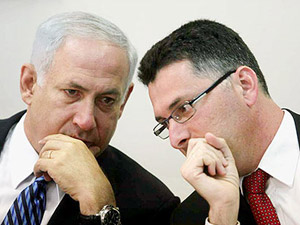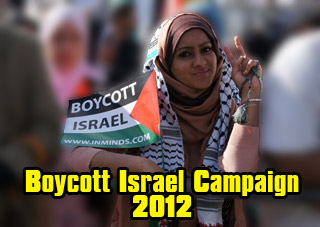
 Innovative Minds © 2014. All Rights Reserved. www.inminds.co.uk | ||||
Israeli academics hit back over bid to pass law that would criminalise themRachel Shabi and Peter Beaumont , The Observer Backlash over threat to outlaw supporters of boycott movement aimed at ending the continued occupation of the West Bank  Israeli Education Minister Gideon Saar(right) of the government of Binyamin Netanyahu(left) wants to outlaw boycotts An academic backlash has erupted in Israel over proposed new laws, backed by the government of Binyamin Netanyahu, to criminalise a handful of Israeli professors who openly support a campaign against the continuing occupation of the West Bank. The Boycott, Divestment and Sanctions (BDS) campaign against Israel has gained rapid international support since Israeli troops stormed a Gaza-bound flotilla of aid ships in May, killing nine activists. Israeli attention has focused on the small number of activists, particularly in the country's universities, who have openly supported an academic boycott of Israeli institutions. A protest petition has been signed by 500 academics, including two former education ministers, following recent comments by Israel's education minister, Gideon Saar, that the government intends to take action against the boycott's supporters. A proposed bill introduced into the Israeli parliament â the Knesset â would outlaw boycotts and penalise their supporters. Individuals who initiated, encouraged or provided support or information for any boycott or divestment action would be made to pay damages to the companies affected. Foreign nationals involved in boycott activity would be banned from entering Israel for 10 years, and any "foreign state entity" engaged in such activity would be liable to pay damages.
A proposed bill introduced into the Israeli parliament â the Knesset â would outlaw boycotts and penalise their supporters. Individuals who initiated, encouraged or provided support or information for any boycott or divestment action would be made to pay damages to the companies affected. Foreign nationals involved in boycott activity would be banned from entering Israel for 10 years, and any "foreign state entity" engaged in such activity would be liable to pay damages.
Saar last week described the petition as hysterical and an attempt to silence contrary opinions. While the vast majority of the signatories do not support an academic boycott of Israel, they have joined forces over what they regard as the latest assault on freedom of expression in Israel. The petition states: "We have different and varied opinions about solving the difficult problems facing Israel, but there is one thing we are agreed on â freedom of expression and academic freedom are the very lifeblood of the academic system." Daniel Gutwein, a history professor at Haifa University who is one of the signatories, described the minister's intervention as an attempt "to make Israeli academia docile, frightened and silent". Although the BDS campaign â in various forms â has been running for over half a decade, it has become an increasingly fraught issue inside Israel in the past year since a small number of academics publicly declared support for a boycott, including Neve Gordon, author of Israel's Occupation and a former paratrooper who was badly injured while serving with the Israeli Defence Force. Speaking to the Observer last week, Gordon said that many Israelis saw support for the BDS as "crossing a red line". Adding that he had received recent death threats, he said: "I am worried about what is happening to the space for debate in Israel. I find that there is a proto-fascist mindset developing. One of the slogans you hear a lot now is no citizenship without loyalty. It is an inversion of the republican idea that the state should be loyal to the citizen." Israeli campaigners believe the Gaza flotilla incident represents a tipping point in raising support for boycotts. Musicians including Elvis Costello, Gil Scott Heron and the Pixies have cancelled shows in Israel. Hollywood actors also snubbed Jerusalem's international film festival and internationally acclaimed writers have supported the BDS movement, which is gaining support in dozens of countries. "It's a different world to what it was even a month ago," says Kobi Snitz, member of an Israeli BDS group. "Suddenly, all sorts of people are supporting it â people that you wouldn't expect." What is most interesting, however, has been the impact in Israel itself. Israeli journalist and blogger Noam Sheizaf wrote recently that such actions are now forcing Israelis "to think about the political issues and about their consequences⦠For a country in a constant state of denial regarding the occupation, this is no small thing." Sheizaf does not promote the boycott, but says: "I will gladly return concert tickets if that is the price for making Israelis understand that the occupation cannot go on." Adi Oz, culture editor on the Tel Aviv weekly Ha'ir, appeared on Israeli national radio explaining her support for recent boycott activity. "When the Pixies cancelled their concert here I was disappointed," she says. "But I was not critical of the Pixies, I was critical of our government, because they are responsible for Israel's isolation." She adds that, post-flotilla, the cultural boycott is "something that everyone has a stand on â and some people are realising that they are in favour of it, without having thought about it before." There has also been a spate of boycott-related discussion in the financial press. The daily business newspaper Calcalist ran an uncritical profile of the Israeli campaigners behind Who Profits, an online database of Israeli and international companies involved in the occupation of the West Bank. The project's co-ordinator, Dalit Baum, of the Coalition of Women for Peace, says: "Every day there is an article about this issue in the Israeli media, which creates a discussion about the economy of the occupation and raises the fact that there's a problem."
Israel's anti-boycott belligerenceMiri Weingarten, The Guardian A bill seeking to outlaw boycotts of Israeli institutions and products â including in settlements â is diplomatically explosive A new "anti-boycott bill", the third in a series of proposed laws that aim to curtail the ability of civil society to criticise Israeli government policy, will punish Israelis or foreign nationals who initiate or promote a boycott of Israel. The bill not only prohibits boycotts of legal Israeli institutions, but also of settlement activities and products. It seeks to impose fines on Israelis who "promote boycotts" and transfer the fines to boycotted organisations. It will impose a 10-year entry ban on foreign residents engaging in boycotts, and forbid them to carry out any economic activities in Israel. Heavy sanctions will also be imposed on "foreign political entities" engaging in boycotts. Any government promoting a boycott will be "prohibited from carrying out any action in Israeli bank accounts, in shares traded in Israel, in land or in any other property requiring registration of transfer", and no money or property will be transferred from Israel to that government. Since the Palestinian Authority is defined by Israel as a "foreign political entity", its recent decision to end its economic dependence on settlements for products, jobs and services will lead to punitive measures. According to the bill, even money or property due to Palestinians and to the PA by virtue of previous "laws, agreements or governmental decisions" will not be transferred to them. The geographical application of the anti-boycott bill to the West Bank ("Judea and Samaria") and the potential annulment of prior agreements will signal a de jure annexation of the West Bank to Israel and a final demise of the Oslo accords signed by the PA and Israel in the mid-1990s. This bill, like others recently tabled, comes against the backdrop of recent analysis by the current Israeli government and its advocates, who have sought to draw a distinction between "legitimate criticism of Israel" and criticism or campaigning that "delegitimises Israel" and is therefore beyond the pale. Alan Dershowitz has called this approach "the 80% case for Israel" â that is, the possibility of criticising specific Israeli policies, such as the settlement project, while emphatically supporting Israel as a Jewish state. Examples of "illegitimate" activities include universal jurisdiction (the prosecution of officials suspected of war crimes overseas), BDS (boycott, divestment and sanctions), and questioning the definition of Israel as a Jewish and democratic state. The recent series of proposed bills in Israel echoes each of these categories by seeking to prohibit them through law and to criminalise human rights activists who engage in such activities. This approach is deeply flawed. There is a difference between disagreeing with criticism and seeking to silence it through law. If Israel is a democracy, its activists must be allowed to voice criticism and engage in protest, however unpopular.
When challenged on the issue of settlement products from the West Bank, the European court of justice recently ruled that only the Palestinian Authority can issue origin certificates for goods originating in the West Bank.
By failing to distinguish between a boycott of settlements and that of Israel itself, the initiators of the bill are demonstrating that they are not "protectors of Israel" but promoters of a "Greater Israel". For them, a boycott of all Israeli products, as such, is no longer distinguishable from alternative, more limited options: the decision of Israeli or international activists to boycott settlement products in order to end the occupation, or the decision of the Palestinians themselves to stop supporting the very settlements that are denying them their sustenance. The settlers and their supporters thus expect Palestinians not only to accept the divestment of their land and resources, but also to support those who have robbed them by buying their produce and working (for sub-minimum wages) on the very building sites that are encroaching on their lands. The EU, also a "foreign political entity" under the Israeli definition, is likely to disagree strongly with this bill. The EU association agreements with Israel (1995) and with the PLO (1997) have a mutually exclusive territorial scope: the EC-Israel agreement applies to the territory of the state of Israel, whereas the EC-PLO agreement applies to the territory of the West Bank and Gaza. When challenged on the issue of settlement products from the West Bank, the European court of justice recently ruled that only the Palestinian Authority can issue origin certificates for goods originating in the West Bank. In court, the EU advocate-general was even clearer. He said that as a matter of international law, the borders of Israel are defined by the 1947 partition plan for Palestine, and any territories outside the 1947 borders do not form part of the territory of Israel for purposes of the association agreement. If the bill passes into law, the EU would qualify as a "promoter of boycott", whereas Israel could be seen to be breaking the terms of the association agreement. The implications of this could be explosive.
Also Of InterestPage URL: http://www.inminds.co.uk/article.php?id=10452
|
|
Support Us
If you agree with our work then please support us.Campaigns INMINDS Facebook Live Feed Latest Video's
INMINDS Twitter Feed Tweets by @InmindsComFeatured Video's
You need Flash player 8+ and JavaScript enabled to view this video.
[all videos (over 200)..] Featured MP3 Podcast  "For most journalists, whether they realize it or not, are groomed to be tribunes of an ideology that regards itself as non-ideological, that presents itself as the natural center, the very fulcrum of modern life. This may very well be the most powerful and dangerous ideology we have ever known because it is open-ended. This is liberalism." Campaigning Journalist and Film-maker Socialism 2007 Conference, Chicago [43min / 21Mb] [all podcasts..] Newsletter Feedback |
 |
 |















































